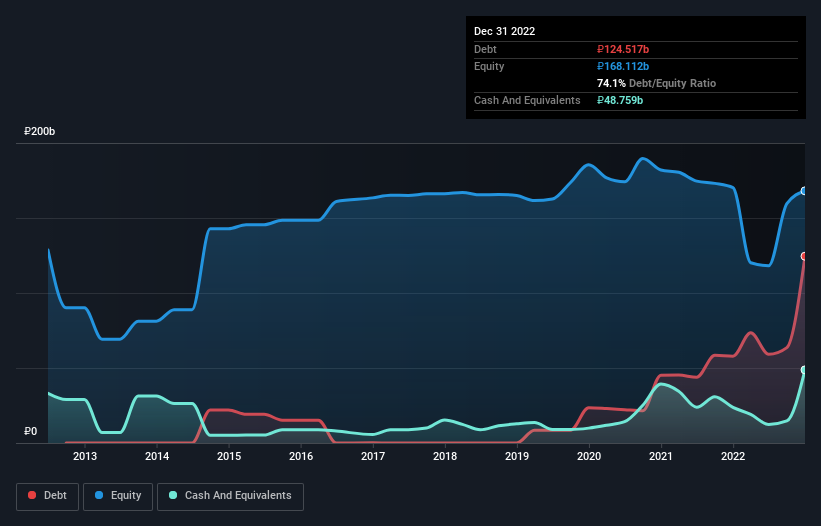VK (LON:VKCO) Has Debt But No Earnings; Should You Worry?

The external fund manager backed by Berkshire Hathaway's Charlie Munger, Li Lu, makes no bones about it when he says 'The biggest investment risk is not the volatility of prices, but whether you will suffer a permanent loss of capital.' It's only natural to consider a company's balance sheet when you examine how risky it is, since debt is often involved when a business collapses. We note that VK Company Limited (LON:VKCO) does have debt on its balance sheet. But should shareholders be worried about its use of debt?
When Is Debt A Problem?
Debt is a tool to help businesses grow, but if a business is incapable of paying off its lenders, then it exists at their mercy. Part and parcel of capitalism is the process of 'creative destruction' where failed businesses are mercilessly liquidated by their bankers. However, a more common (but still painful) scenario is that it has to raise new equity capital at a low price, thus permanently diluting shareholders. Of course, plenty of companies use debt to fund growth, without any negative consequences. When we examine debt levels, we first consider both cash and debt levels, together.
View our latest analysis for VK
What Is VK's Debt?
As you can see below, at the end of December 2022, VK had ₽124.5b of debt, up from ₽57.9b a year ago. Click the image for more detail. However, it does have ₽48.8b in cash offsetting this, leading to net debt of about ₽75.8b.

How Strong Is VK's Balance Sheet?
According to the last reported balance sheet, VK had liabilities of ₽142.3b due within 12 months, and liabilities of ₽50.5b due beyond 12 months. On the other hand, it had cash of ₽48.8b and ₽67.3b worth of receivables due within a year. So it has liabilities totalling ₽76.8b more than its cash and near-term receivables, combined.
This deficit casts a shadow over the ₽15.9b company, like a colossus towering over mere mortals. So we'd watch its balance sheet closely, without a doubt. At the end of the day, VK would probably need a major re-capitalization if its creditors were to demand repayment. There's no doubt that we learn most about debt from the balance sheet. But ultimately the future profitability of the business will decide if VK can strengthen its balance sheet over time. So if you're focused on the future you can check out this free report showing analyst profit forecasts.
In the last year VK wasn't profitable at an EBIT level, but managed to grow its revenue by 19%, to ₽98b. We usually like to see faster growth from unprofitable companies, but each to their own.
Caveat Emptor
Importantly, VK had an earnings before interest and tax (EBIT) loss over the last year. Its EBIT loss was a whopping ₽5.5b. If you consider the significant liabilities mentioned above, we are extremely wary of this investment. That said, it is possible that the company will turn its fortunes around. But we think that is unlikely, given it is low on liquid assets, and burned through ₽7.8b in the last year. So we consider this a high risk stock and we wouldn't be at all surprised if the company asks shareholders for money before long. When analysing debt levels, the balance sheet is the obvious place to start. But ultimately, every company can contain risks that exist outside of the balance sheet. These risks can be hard to spot. Every company has them, and we've spotted 2 warning signs for VK you should know about.
When all is said and done, sometimes its easier to focus on companies that don't even need debt. Readers can access a list of growth stocks with zero net debt 100% free, right now.
New: Manage All Your Stock Portfolios in One Place
We've created the ultimate portfolio companion for stock investors, and it's free.
• Connect an unlimited number of Portfolios and see your total in one currency
• Be alerted to new Warning Signs or Risks via email or mobile
• Track the Fair Value of your stocks
Have feedback on this article? Concerned about the content? Get in touch with us directly. Alternatively, email editorial-team (at) simplywallst.com.
This article by Simply Wall St is general in nature. We provide commentary based on historical data and analyst forecasts only using an unbiased methodology and our articles are not intended to be financial advice. It does not constitute a recommendation to buy or sell any stock, and does not take account of your objectives, or your financial situation. We aim to bring you long-term focused analysis driven by fundamental data. Note that our analysis may not factor in the latest price-sensitive company announcements or qualitative material. Simply Wall St has no position in any stocks mentioned.
About LSE:VKCO
VK
VK Company Limited operates as a technology company in Russia and internationally.
Slightly overvalued with questionable track record.
Similar Companies
Market Insights
Community Narratives


